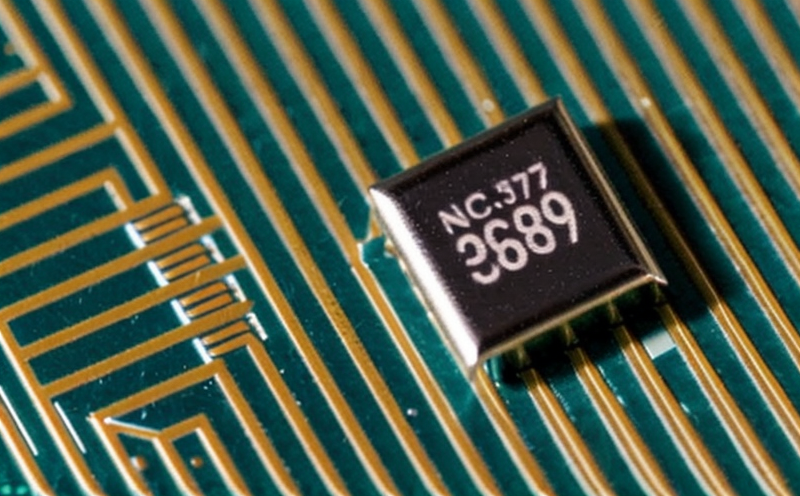ASTM F1291 Surface Topography Reliability Testing
The ASTM F1291 standard is crucial in semiconductor and microchip testing, specifically for the reliability assessment of surface topography. Surface topography plays a pivotal role in determining the performance and longevity of microchips by influencing factors such as electrical conductivity, thermal management, and mechanical integrity.
ASTM F1291 provides a standardized method to evaluate the surface roughness and texture of semiconductor devices. This test is essential because it helps identify potential defects or areas of concern that could lead to performance degradation over time. The primary objective is to ensure that microchips meet stringent quality standards, which are critical for their reliability in high-stress environments.
The ASTM F1291 method involves the use of an atomic force microscope (AFM) or similar tool to measure surface topography on a microscopic scale. This measurement helps in assessing the micro-roughness and defects that might not be detectable with conventional optical techniques. The test is particularly useful for identifying issues like wear, corrosion, and manufacturing defects that can impact the performance of microchips.
The ASTM F1291 standard defines specific acceptance criteria based on the roughness parameters derived from these measurements. These parameters include the root mean square (RMS) roughness, peak-to-valley height, and the average surface roughness. Compliance with these criteria ensures that microchips meet industry standards for reliability and performance.
Surface topography testing is not just about identifying defects; it also helps in understanding how various environmental factors might affect a microchip’s performance over its lifetime. For instance, temperature cycling tests are often conducted alongside ASTM F1291 to simulate real-world operating conditions. This integrated approach provides a comprehensive view of the microchip's reliability under different stress scenarios.
The importance of surface topography testing in semiconductor and microchip manufacturing cannot be overstated. As technology advances, so too does the complexity of devices. Ensuring that every component meets stringent quality standards is critical for maintaining high levels of performance and reliability. ASTM F1291 provides a robust framework to achieve this, making it an indispensable tool in the quality assurance toolkit.
- Surface Roughness Measurement: Using advanced microscopy techniques like AFM to measure surface roughness parameters.
- Defect Identification: Detecting microscopic defects that could compromise device performance over time.
- Environmental Stress Testing: Simulating real-world conditions to assess long-term reliability.
Why It Matters
The reliability of semiconductor devices is paramount in industries where performance and longevity are critical. Microchips used in automotive, aerospace, and medical electronics must withstand harsh environmental conditions while maintaining high levels of precision and accuracy.
Surface topography plays a crucial role in determining the overall quality and lifespan of these devices. Irregularities on the surface can lead to increased electrical resistance, thermal inefficiencies, or even complete device failure. ASTM F1291 testing helps ensure that microchips are free from such defects, thereby enhancing their reliability.
By using this standardized method, manufacturers and quality managers can identify potential issues early in the production process. This proactive approach not only improves product quality but also reduces costly rework and recalls. Additionally, compliance with ASTM F1291 ensures that products meet industry standards, which is essential for gaining market acceptance.
The test results provide valuable insights into how different manufacturing processes or environmental factors might affect the performance of microchips. This information can be used to refine production techniques and improve overall product quality. In turn, this leads to more robust devices that are better suited for demanding applications.
Why Choose This Test
The ASTM F1291 Surface Topography Reliability Testing is a critical tool in the semiconductor and microchip testing arsenal. It provides a detailed analysis of surface roughness, which is essential for ensuring high-quality performance over an extended operational life.
One of the key reasons to choose this test is its ability to detect microscopic defects that might not be visible through other means. These defects can significantly impact the reliability and longevity of microchips, especially in harsh environments. By identifying these issues early, manufacturers can take corrective actions before the products reach the market.
The test results are highly reliable and repeatable, making it a trusted method for quality assurance. Compliance with ASTM F1291 ensures that microchips meet stringent industry standards, which is crucial for gaining market acceptance. Additionally, this standard provides a consistent approach to testing across different manufacturers and facilities, ensuring uniformity in the quality of products.
The ability to simulate real-world conditions through environmental stress tests adds another layer of value to ASTM F1291 testing. This integrated approach helps ensure that microchips are not only reliable but also capable of performing optimally under various operating conditions. In industries where performance and longevity are critical, such as automotive or aerospace, this is particularly important.
Quality and Reliability Assurance
- Compliance with ASTM F1291: Ensuring that surface topography meets industry standards for reliability and performance.
- Environmental Stress Testing: Simulating real-world conditions to assess long-term reliability.
- Data Analysis: Evaluating the test results to identify potential issues and areas for improvement.
The ASTM F1291 standard is essential in ensuring that semiconductor devices meet rigorous quality standards. By adhering to this method, manufacturers can guarantee that their products are reliable and capable of performing consistently over time. This not only enhances product quality but also builds customer trust and satisfaction.
Environmental stress testing, conducted alongside ASTM F1291, helps in understanding how different operating conditions might affect the performance of microchips. This information is invaluable for optimizing production processes and improving overall product reliability. In industries where performance and longevity are critical, such insights can make a significant difference.
Data analysis plays a crucial role in interpreting the results of ASTM F1291 testing. By evaluating the roughness parameters and other relevant data, manufacturers can identify potential issues and areas for improvement. This proactive approach not only enhances product quality but also ensures that microchips meet stringent industry standards.





